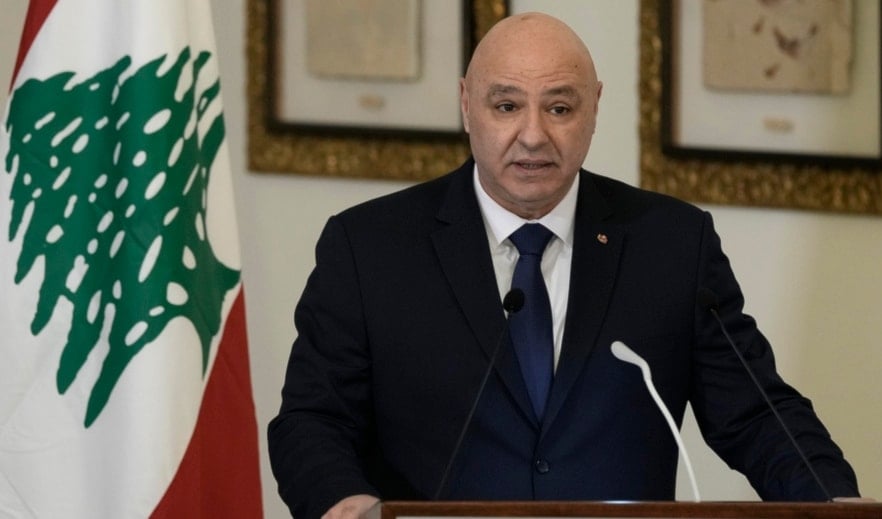No more reason for Syrian refugees to stay in Lebanon: President Aoun
Over 200,000 Syrian refugees have already returned to their homeland, according to UN data.
-

Lebanese President Joseph Aoun speaks during a joint news conference with French President Emmanuel Macron at the presidential palace in Baabda, in east of Beirut, Lebanon, Friday, January 17, 2025. (AP)
Lebanese President Joseph Aoun has called on the United Nations to take immediate action in organizing the return of Syrian refugees to their homeland, following the recent deposition of Bashar al-Assad in Damascus. The appeal, reported by Lebanon's state-run news agency NNA, was made during a meeting with UN High Commissioner for Refugees Filippo Grandi, who is currently visiting Beirut.
President Aoun argued that with al-Assad no longer in power, the refugees who fled his administration should now return home. "They have no reason to stay in Lebanon anymore," Aoun reportedly said. He also urged the international community to provide financial and humanitarian aid to ensure the repatriation process is carried out safely and effectively, alleviating the strain on Lebanon's resources.
الرئيس عون استقبل فيليبو غراندي المفوض السامي للأمم المتحدة لشؤون اللاجئين حيث شدد على ضرورة عودة النازحين السوريين لا بقاءهم في لبنان وطلب من الامم المتحدة تنظيم مواكب العودة وتوفير الدعم اللازم لها pic.twitter.com/jj5ANXz3qg
— Lebanese Presidency (@LBpresidency) January 23, 2025
Growing interest in return
During the meeting, Grandi shared UN data indicating that over 200,000 Syrian refugees have already returned to their homeland. He also noted a significant rise in the percentage of refugees expressing a desire to go back, which has increased from 1% to 30% within weeks. However, Grandi noted that these returns must be carefully managed. "Returns must be gradual to prevent an exacerbation of challenges within Syria," he stated.
The United Nations has reported that, in addition to refugees returning from abroad, approximately half a million internally displaced persons have also begun resettling in Syria since the change of power.
However, many returnees are facing significant challenges, including limited access to basic services, damaged infrastructure, and ongoing instability. Reports indicate that less than half of the returnees have access to water and healthcare, complicating efforts to reintegrate displaced populations.
Additionally, legal and economic barriers have made returning difficult for many Syrians. The lack of essential legal documents has hindered property claims and access to public services, while the country's struggling economy offers limited opportunities for rebuilding livelihoods.
Read more: New Syrian leadership to privatize oil, cotton, ports to boost economy
Border crossings and security concerns
Although Lebanon's General Security Office had announced that the Masnaa border crossing would remain open for Syrian nationals, the situation remains complex. The United Nations High Commissioner for Refugees (UNHCR) clarified that many crossings, including those in northern Lebanon, are not fully operational, and some refugees are returning through unofficial routes like Wadi Khaled. These logistical challenges have partly slowed the repatriation process.
Adding to these challenges, "Israel’s" continued illegal presence in Syria is contributing to regional instability. Ongoing Israeli airstrikes and violations of Syrian sovereignty have hindered reconstruction efforts and exacerbated security risks for returning refugees. These actions have further delayed the stabilization of key regions needed to accommodate returning populations.
Read more: Damascus demands 'Israel' cease actions on its territory: MoD
The German Embassy in Lebanon recently highlighted these challenges during its visit to the Land Border Regiment at the Syrian border and the Masnaa Crossing Point. The embassy described its visit as an opportunity to gain "deep insights into the challenging situation" and noted discussions about potential future support and assistance to improve conditions.
Our first visit of the Land Border Regiment at the Syrian border and the Masnaa Crossing Point provided deep insights into the challenging situation there.
— Germany in Lebanon 🇩🇪🇱🇧 (@GermanEmbBeirut) January 23, 2025
Discussions also touched areas of possible future support and assistance. pic.twitter.com/waRm0pj55L
Meanwhile, the Lebanese Army has reinforced its presence along the border, citing the "delicate circumstances" following Assad's fall. Lebanese caretaker Prime Minister Najib Mikati has also emphasized the need for tightened border control to address the repercussions of developments in Syria.
Previous calls for action
Last month, Lebanese caretaker Prime Minister Najib Mikati also highlighted the urgent need for Syrian refugees to return home during a political festival in Rome. Mikati emphasized that Lebanon hosts the highest number of refugees per capita globally, with over one-third of its population now comprising Syrian nationals. "The strain on our resources has been substantial, worsening existing economic trouble and creating fierce competition for jobs and services," he said.
Mikati noted that the best resolution to the refugee crisis is for Syrians to return home, particularly after the political transformation in Syria. He called on the international community, especially European nations, to support early recovery efforts in secure areas of Syria, ensuring a sustainable and dignified return for refugees.
Read more: European countries reassess Syrian migrant status, deportation plans
Lebanon, with a population of 5.8 million, is currently hosting approximately two million Syrian refugees, including over 800,000 registered with the United Nations. Mikati also pointed out that Lebanon needs at least $5 billion for reconstruction, as estimated by the World Bank, further underscoring the economic burden caused by the prolonged refugee crisis.

 5 Min Read
5 Min Read








